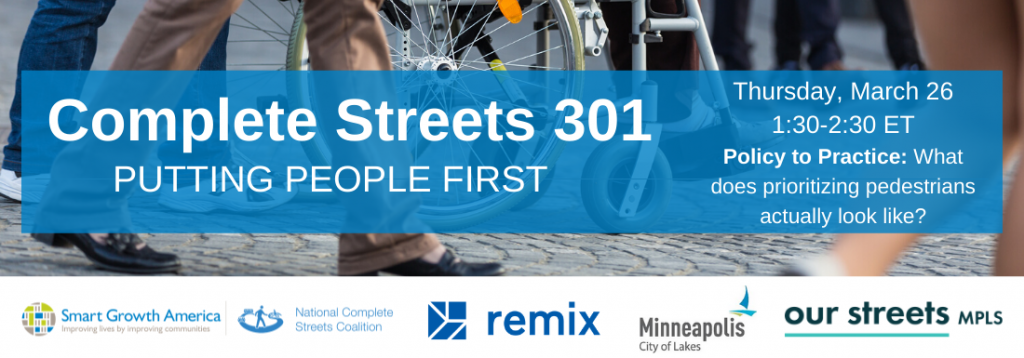
News
By Mae Hanzlik, March 17, 2020
Join us for a webinar on March 26 to hear how Minneapolis has worked to prioritize pedestrians and advance multimodal transportation through advocacy, policy, and safer street design. This is the latest installment in our monthly webinar series Complete Streets 301: Putting people first.
Across the country, cities are taking steps to create safer, more accessible transportation systems. The strategies to achieve safer systems have run the gamut from passing Complete Streets policies and centering pedestrians in infrastructure design, to adopting Vision Zero programs and strategies.
In 2016, the City of Minneapolis passed its Complete Streets policy and within it established a “modal priority framework” stating that the city will “prioritize public right-of-way use in the following order: walking, biking or taking transit, and driving motor vehicles.”
This is a big deal. Especially in a country that overwhelmingly prioritizes vehicle speeds over the safety and mobility of people. Our focus on speed is one reason almost 50,000 pedestrians were struck and killed by drivers in the U.S. between 2008 and 2017.
But what does it actually look like to prioritize pedestrians? Join the National Complete Streets Coalition and experts from Remix, the City of Minneapolis, and Our Streets Minneapolis for a webinar on March 26 to hear how Minneapolis is working to prioritize pedestrians and advance multimodal transportation through advocacy, policy, and safer street design.
On the webinar, we'll be joined by:
Janice Park, a Senior Transportation Manager at Remix who works with transit agencies across the U.S. to develop technology solutions that dramatically improve the planning process while enabling greater exploration and public engagement. Janice is passionate about the future of cities and the intersection of technology and planning to promote sustainable growth. Previously, Janice conducted economics research and wrote for the Urban Institute in Washington, DC, studied TODs, parking, and transit for UC Berkeley, served as an analyst for San Francisco MTA, and worked with a variety of public agencies as a consultant with Cambridge Systematics. She has a bachelors' in economics from Pomona College and holds two master's degrees in city planning and transportation engineering from UC Berkeley.
Isaac Shapiro, an Enterprise Customer Success Manager at Remix who works with transit agencies across the country, from the Northeast to the Pacific Northwest. Isaac partners with his customers for training and support to improve their transit systems. Prior to joining Remix, Isaac worked as a transportation and planning consultant and a federal health care policy analyst. He is passionate about helping local governments build more livable cities that support their communities. He holds a bachelor’s degree in history from Carleton College.
Trey Joiner, an Associate Transportation Planner with the City of Minneapolis who works within the Transportation Planning and Programming Division. Before working for the city, he provided transportation planning guidance and technical expertise to approximately 20 counties in east Tennessee. Starting in 2018 with the City of Minneapolis, he now works on a variety of planning activities related to coordinating development impacts to the public right of way, capital improvement program planning, and bikeway design and operations. He is a Georgia native but is slowly getting accustomed to the northerner lifestyle. He holds a bachelor’s degree in urban and regional planning from the University of West Georgia.
Ashwat Narayanan, the Executive Director of Our Streets Minneapolis. He has eight years of experience advocating for cleaner and more equitable transportation systems in the Midwest. Before Our Streets Minneapolis, he developed legislative, legal, and community organizing campaigns in Wisconsin to shift funding away from polluting highway expansion, and into biking, walking, and transit. He was appointed by Wisconsin Governor Tony Evers to the state’s Transportation Task Force that set statewide transportation priorities. In Minnesota, Ash serves on the Minnesota Department of Transportation’s Sustainable Transportation Advisory Committee, and represents Minneapolis on Metropolitan Council’s Transportation Advisory Board. His background is in civil and transportation engineering.
Related News

© 2025 Smart Growth America. All rights reserved
Site By3Lane Marketing













